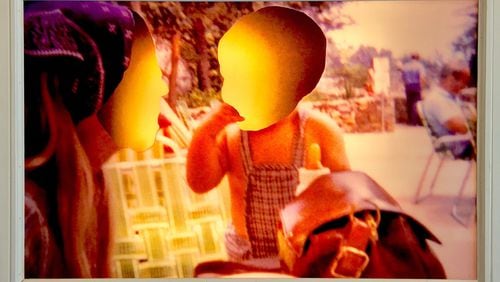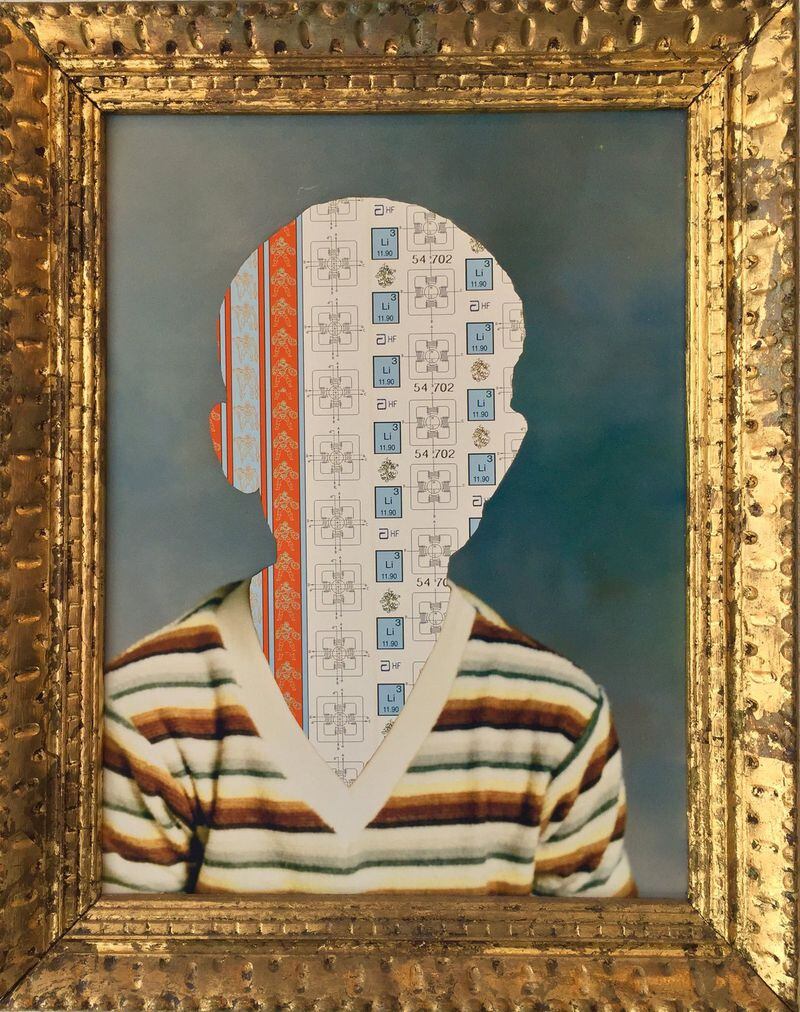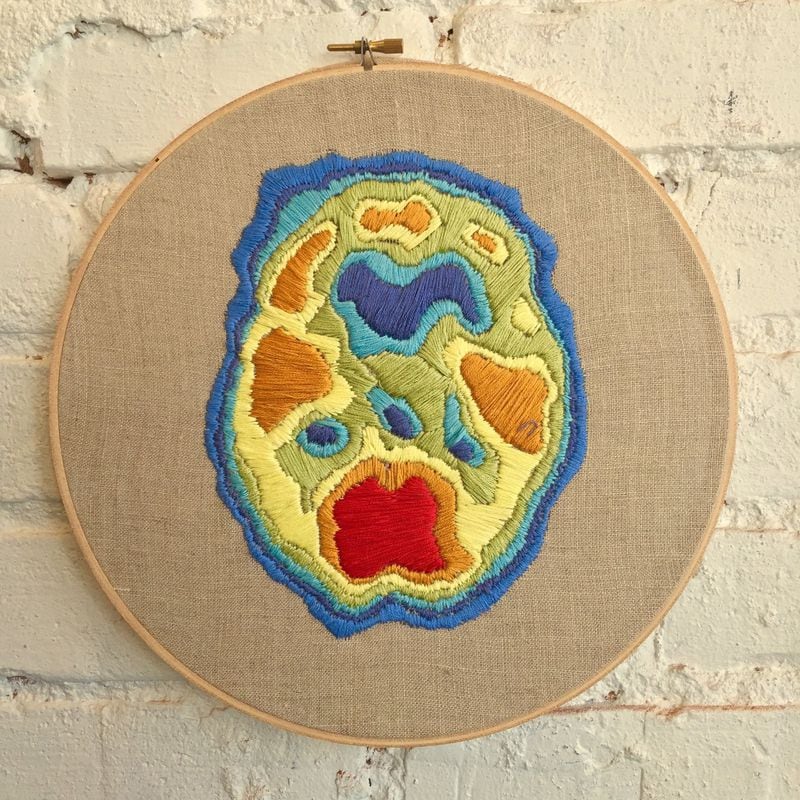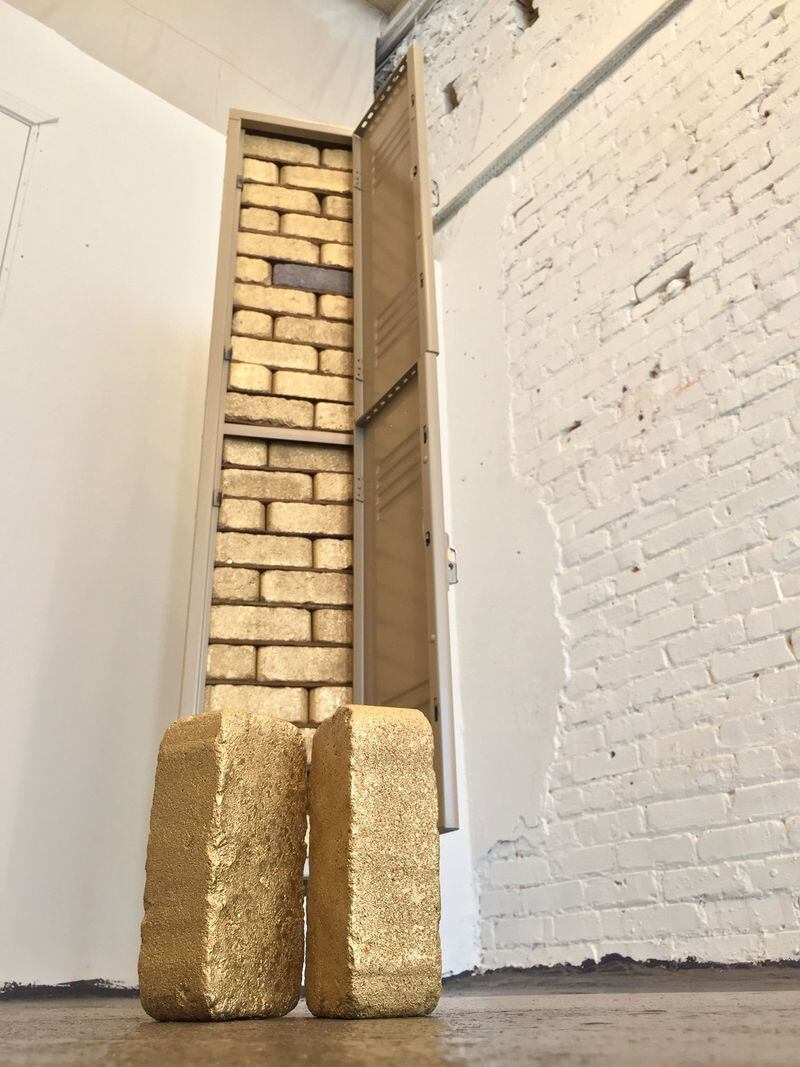Soft, squishy objects and equally vulnerable, raw depictions of childhood define David Gabbard's solo show "Common Threads" at Paper Plane Gallery. Diagnosed at age 15 with bipolar disorder, a condition he discovered he shared with his mother, Gabbard has used his art as an exorcism of childhood traumas. "Common Threads" speaks to Gabbard's personal bond with his mother. But in looking beyond the cliché of childhood as a blissful, storybook state, "Common Threads" also has a far more universal appeal.
A subtle sense of chaos defines the childhood tableaux here, as in an installation featuring a child’s brightly hued plastic table and chairs. On the surface, this cheery playscape evokes a happy activity zone defined by classic childhood toys Lite Brite and Etch A Sketch. But all of these objects, crafted from fabric, instead emphasize vulnerability. Gabbard calls his chosen materials of corduroy, felt and jersey “malleable memory,” and these tumultuous little scenes become powerful touchstones, dealing with the anger, frustration, sadness and other feelings roiling below the surface of an idealized vision of childhood. “There’s always a little bit of darkness,” Gabbard says of his scenarios.
Look closer at the scene and you can see the tiny chairs are toppled, the Etch A Sketch lies abandoned on the floor and the image on Gabbard’s Etch A Sketch of a cozy home spells out “Illusion.” Likewise, an image of the Incredible Hulk on the Lite Brite screen also speaks volumes. That fragile, flawed comic book hero easily sent into a rage serves here as stand-in and spokesman for all of the emotional fracas suggested in this volatile vignette. In another installation, a video game frozen with the message “Game Over” has been abandoned, along with a spilled bag of Doritos and a can of Coke flowing into the shag carpet.
What Gabbard conveys in these scenes is a sense of upheaval and trauma rooted in his own experiences, marked by the touchstones of the era: the Incredible Hulk, Nintendo, McDonald’s, Dumbo and Curious George. A sense of empathy is engendered through these familiar objects, including the family photos and school photos that Gabbard uses to both personalize and universalize his experience.
In a foray into more stark, conceptual work, Gabbard creates a bathroom vignette of blank sterility: white sink, white rug, white toothbrush, a scene made troubling with key details like a spilled bottle of pills that suggest childhood trauma moving into an adult realm.
Gabbard’s investigation of a complicated, fraught childhood continues in a series of four skillfully embroidered pieces, “Mental Terrain (Schizophrenia),” of brain scans rendered in vivid colors in embroidery floss. Like the artist Mike Kelley, who often found the angst and melancholy in hand-crocheted stuffed animals, there is something endearing in Gabbard’s devotion to what might be called “womanly” craft techniques. Gabbard effectively turns the investment of time in these pastimes into his own powerful statements. If the act of knitting and sewing is a statement of love, in Gabbard’s hands, it becomes a vehicle for revelation about the levels of pain, alienation and loneliness that circulate beneath the surface of the mirage of happy homes and happy families.
“Common Threads” doesn’t always hit its mark as Gabbard veers away from the tactile, human and humble materials of his soft sculptures into more conceptual work that puts emotional effect at a safe distance. Many of those works lack the sense of vulnerability and close-to-the-bone honesty that Gabbard conveys so well in his memory-based fabric sculptures.
ART REVIEW
“Common Threads: Selected Work From David Gabbard”
Through March 4. Noon-5 p.m. Fridays and Saturdays. Paper Plane Gallery, 3731 Main St. #2, College Park. 404-669-6594, www.paperplaneatl.com.
Bottom line: An emerging artist uses ordinary, familiar materials and children’s toys to create a connection to his own difficult childhood.
About the Author









